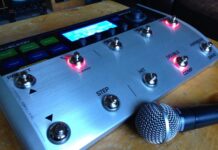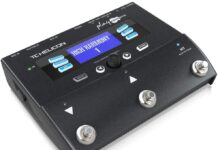First off, for those who are new to using vocal effects processors, let us talk about what these vocal effects processors are and how they are used.
Vocal effects pedals are electronic devices that are used in both a live and studio environment that help enhance a lead or backing vocal with an underlying vocal effect, and this underlying vocal effect could be reverb, delay, echo flange, EQ, Low-pass filter, pitch correction or autotune, and so forth.
These effects are mostly used by artists live on stage to imitate the studio version of a particular song. Although vocal effects processors are mostly used in a studio environment, to give an effect to an already existing vocal take, they are actually used more often in a live performance event.
Many singers have different vocal requirements for what it is that they want in a vocal processor.
Who Needs a Vocal Effects Processor?
Any vocalist that performs on stage and wants to enhance their overall vocal sound would find a vocal effects processor quite useful.
Some people, like the vocal purists, may not look kindly on the use of vocal effects pedals that would digitally alter their natural singing voice; and even though such artists who have built their careers on heavy use of vocal effects, with the likes of Cher, T-Pain, would strongly disagree with this very opinion, it is clear that other instrument players are not attacked with the use of live digital enhancement, making the point against singers using vocal effects processors redundant and somehow myopic.
A typical example is that of a guitarist or a bassist using effects like bass octave pedals or a guitar eq pedal.
Many music lovers usually prefer to listen to a singer sing live and not the robotic-style music from the studio, but what they fail to realize is that all vocal effects can be controlled, monitored and limited, and so, the subtle use of these effects can have dramatic effects on the vocal performance, and these would make them sound natural.






